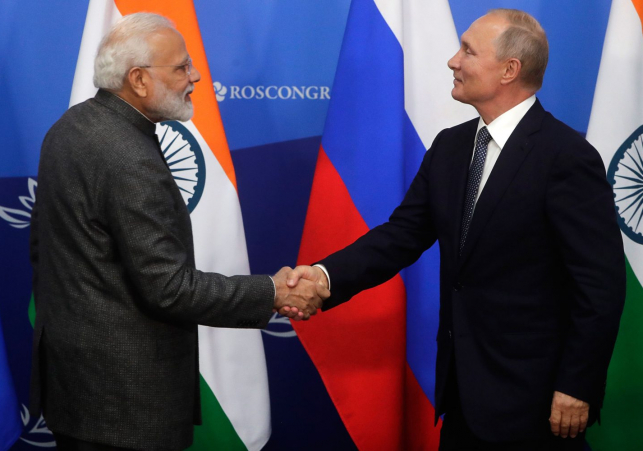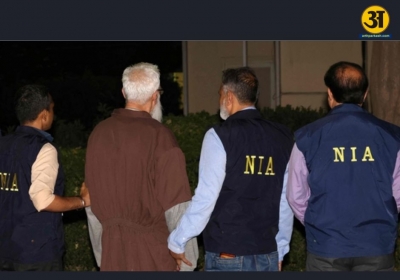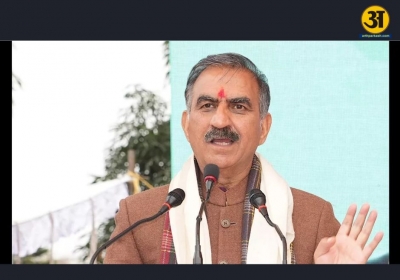
Russian Charge d'Affaires Roman Babushkin said on Wednesday.
India's "independent and balanced" stance, praised by Russia
Russian Charge d'Affaires Roman Babushkin said on Wednesday that Russia appreciates India's "independent and balanced" approach to world issues, including the situation in Ukraine, and that the fallout from the crisis will have no impact on bilateral cooperation in sectors like defense.
As the new envoy has yet to present his credentials, Babushkin, the most senior Russian diplomat in New Delhi, said during a virtual briefing on the Ukraine crisis that the India-Russia strategic partnership is built on mutual trust and respect, and that both sides take each other's concerns "very seriously." Additionally, neither country "interfere in domestic affairs."
“We welcome the independent position India has taken in the UN Security Council twice already [and] which was expressed openly by the Indian external affairs minister and other officials,” Babushkin was alluding to Indian statements made at two Security Council meetings over the Ukraine situation.
As a non-permanent member of the United Nations Security Council, India plays the "vital role of a responsible global power," he said, and has taken an "independent and balanced approach to global affairs."
In response to a query on the impact of Western sanctions on India-Russia defense cooperation, Babushkin said such sanctions would harm Russia's economy and banking system, as well as increase instability due to a "atmosphere of mistrust and continuous fear."
He said, “We keep in mind the possibility of negative influence of sanctions with regard to our cooperation in particular affairs, including defence. But at the same time, when it comes to our case with India, we have very strong and [long-standing] trusted cooperation...,”
He further said, “We continue our work with our Indian partners in defence. We have big plans and we hope that our partnership will continue further at the same level we are enjoying today.” Russia will have a "huge participation" at India's next Defexpo event, he added.
He said bilateral defense cooperation is a "strong factor of international peace and stability" that "fully reflects the national interests of both countries."
India is one of the few nations that has not condemned Russia's massing of soldiers at Ukraine's borders. India has only expressed profound worry at the rise of tensions at the United Nations Security Council, calling on all parties to display "utmost patience" while stepping up diplomatic efforts to find a solution that ensures all countries' "legitimate security interests."
In recent days, however, Western observers have questioned India's posture, with some pointing out that it is the only member of the Quad that has not condemned Russia. Australia, Japan, and the United States, the other members of the Quad, have announced penalties against Russia, but India has stated that it does not have a sanctions policy.
Russia remains India's top supplier of key military gear, and it began supplying the S-400 air defense system late last year, coinciding with President Vladimir Putin's annual summit visit to New Delhi. During their December summit, the two countries signed an agreement for a 10-year defense cooperation program.
Russia, according to Babushkin, has learned to cope with sanctions. "It is sometimes even good to Russia," he continued, “Sometimes it is even beneficial to Russia, because we have learnt how to live independently, not relying too much on Western technologies and financial resources,” he said. He added there are a lot of big defence projects in the pipeline and Russia has “full confidence that all our plans will be successfully implemented”.
He observed that India and Russia "don't threaten each other with unilateral sanctions and don't interfere in each other's domestic affairs," and that their cooperation "doesn't pose any threat to anyone." "At the same time, we continue to move shoulder to shoulder in our major mission of establishing equitable and equal multipolarity based on universally accepted values, international standards, and the UN's fundamental role," he said.
Regarding the situation in Ukraine, Babushkin stated that Russia has always been in favor of dialogue and that the Minsk Agreements, which ended violence in the Donetsk and Luhansk regions of eastern Ukraine and established a framework for talks, took seven years to implement.
"We are still open to negotiation," he added, recalling that Russia revealed its "red lines" for talks in December, which included NATO enlargement, security assurances, and Ukraine's demilitarization. According to him, such discourse should be mutually courteous and equal, taking into account the interests of all countries.
The Ukrainian administration, according to Babushkin, is "unwilling to implement" the Minsk Agreements. “Along with that, we would expect our Western partners to be more concrete on the Russian red lines. They should refrain from rhetoric and unilateral and motivated policies, and respect international law and commitments.”





